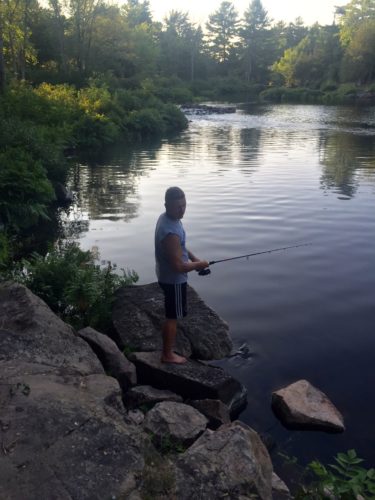James Tober, The Sweet Potato’s red seal certified butcher & fishmonger, provides his thoughts on farmed fish

I’m not a city guy. I grew up in the country, hunting and fishing to help fill our freezer for the winter – and fill it we did, with moose, bear, deer, pickerel, salmon, bass and smelt, all caught in the wild. Between me and my five brothers and sisters, the family had to supplement our catch with farmed meats too, obtained on our weekly grocery store run.
In my mid teens I left the country, but I still return as often as I can. Every year on my return I’ve noticed it’s become increasingly hard to catch fish. The water is warmer, there are more worms in the fish I do catch, and there’s a lot more algae. This last summer, on our trip out to my dad’s, my daughter and I caught nothing! I didn’t want to believe it was my fishing skills, so I started to ask around. And sure enough, I kept hearing the same refrain: year after year it’s increasingly hard to catch fish. Stocks are depleted from the abundance I remember 20 years ago.
My next question was: WHY? These lakes don’t suffer from overfishing. So what’s going on here? Every single person I spoke with answered the same way: pollution and runoff are affecting spawning grounds and killing fish.
As a chef, butcher, fishmonger and dad, this hit me hard. Sourcing local, sustainable, and healthy options are a priority for me both personally and professionally. Where does this leave us?
Farmed Fish as a sustainable option
There’s no question there’s stigma and misinformation about farmed fish. Seventy percent of customers will walk away from the fish counter when they learn a particular fish is farmed, even though it’s Ocean Wise and Best Aquatic Practices (BAP) Certified. Interestingly, many of those people will then walk over to the meat counter and buy farmed meat without a second thought.
We need to start thinking about farmed fish the way we think about all animal farming: There’s the good, the bad, and the ugly. The process matters. The certification matters. The individual farm matters.
I’ve been lucky enough in my career to meet people who are as passionate as I am about quality food, and who care about local sustainable options. So I reached out to Ned Bell, Executive Chef at Ocean Wise. Ned’s an international expert on sustainable seafood, and when I asked him about farmed fish he was absolutely clear on the subject: Wilderness is NOT a measure of seafood quality. He told me that we need to compare fish farming to other farming practices. This is a really novel way of thinking about this, even for me. But really, when was the last time you ate wild cow or pig?
Ned told me that, the way things stand, wild fish won’t be a sustainable option 40 years from now. Between pollution and overfishing, we have so damaged the oceans and wild fish stocks that inland aquaculture is our best way forward to help wild fish stocks recover. (Mind you, we definitely also need a global strategy to address pollution – but that’s a topic for a separate post). Ensuring your farmed fish is coming from a farm that meets the highest standards that govern fish and seafood farming matters immensely.
Fish farming, when done right, yields a great quality product and, when you take a long-term view of wild fish populations, is certainly a sustainable option. It’s also the only way to enjoy certain species of fish. Some of the pros of fish farming include: There is less water waste, no use of antibiotics, all the waste that is produced can be turned into compost and fertilizer, and the waste water is kept out of oceans.
And don’t forget, all organic fish are always, necessarily, farmed – how else would you know what the fish ate? That organic standard is about the quality standards that govern the water and feed – and is impossible to validate with a wild population.
Here at The Sweet Potato we know exactly where our food is coming from. We know about the farms we work with, including the source of farmed fish. We have certificates that demonstrate our offerings meet Best Aquaculture Practices (BAP). We work with National and International NGOs like OceanWise to ensure the choices we make here are the healthiest for both families and the planet.
I hope I have slightly if not completely changed your mind on inland farmed fish. It is a clean, sustainable, and viable way of putting fish in our diet. And it’s probably the only way my daughter will get the opportunity to grab a pole and show her kids how to fish.
